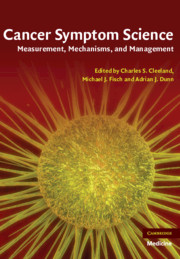Book contents
- Frontmatter
- Contents
- Contributors
- Foreword
- Credits and acknowledgements
- Section 1 Introduction
- Section 2 Cancer Symptom Mechanisms and Models: Clinical and Basic Science
- 4 The clinical science of cancer pain assessment and management
- 5 Pain: basic science
- 5a Mechanisms of disease-related pain in cancer: insights from the study of bone tumors
- 5b The physiology of neuropathic pain
- 6 Cognitive dysfunction: is chemobrain real?
- 7 Cognitive impairment: basic science
- 8 Depression in cancer: pathophysiology at the mind-body interface
- 9 Depressive illness: basic science
- 9a Animal models of depressive illness and sickness behavior
- 9b From inflammation to sickness and depression: the cytokine connection
- 10 Cancer-related fatigue: clinical science
- 11 Developing translational animal models of cancer-related fatigue
- 12 Cancer anorexia/weight loss syndrome: clinical science
- 13 Appetite loss/cachexia: basic science
- 14 Sleep and its disorders: clinical science
- 15 Sleep and its disorders: basic science
- 16 Proteins and symptoms
- 17 Genetic approaches to treating and preventing symptoms in patients with cancer
- 18 Functional imaging of symptoms
- 19 High-dose therapy and posttransplantation symptom burden: striking a balance
- Section 3 Clinical Perspectives In Symptom Management and Research
- Section 4 Symptom Measurement
- Section 5 Government and Industry Perspectives
- Section 6 Conclusion
- Index
- Plate section
- References
16 - Proteins and symptoms
from Section 2 - Cancer Symptom Mechanisms and Models: Clinical and Basic Science
Published online by Cambridge University Press: 05 August 2011
- Frontmatter
- Contents
- Contributors
- Foreword
- Credits and acknowledgements
- Section 1 Introduction
- Section 2 Cancer Symptom Mechanisms and Models: Clinical and Basic Science
- 4 The clinical science of cancer pain assessment and management
- 5 Pain: basic science
- 5a Mechanisms of disease-related pain in cancer: insights from the study of bone tumors
- 5b The physiology of neuropathic pain
- 6 Cognitive dysfunction: is chemobrain real?
- 7 Cognitive impairment: basic science
- 8 Depression in cancer: pathophysiology at the mind-body interface
- 9 Depressive illness: basic science
- 9a Animal models of depressive illness and sickness behavior
- 9b From inflammation to sickness and depression: the cytokine connection
- 10 Cancer-related fatigue: clinical science
- 11 Developing translational animal models of cancer-related fatigue
- 12 Cancer anorexia/weight loss syndrome: clinical science
- 13 Appetite loss/cachexia: basic science
- 14 Sleep and its disorders: clinical science
- 15 Sleep and its disorders: basic science
- 16 Proteins and symptoms
- 17 Genetic approaches to treating and preventing symptoms in patients with cancer
- 18 Functional imaging of symptoms
- 19 High-dose therapy and posttransplantation symptom burden: striking a balance
- Section 3 Clinical Perspectives In Symptom Management and Research
- Section 4 Symptom Measurement
- Section 5 Government and Industry Perspectives
- Section 6 Conclusion
- Index
- Plate section
- References
Summary
Multiple and severe symptoms profoundly affect the quality of life of cancer patients and their families, and also are a significant challenge for those who manage patients with cancer. Untreated symptoms can negatively influence the effectiveness of curative treatment by interrupting or terminating therapy. It is likely that the association of co-occurring symptoms reflects a common underlying mechanism.
Some self-reported symptoms have been related to the actions of specific cytokines that appear to produce a constellation of symptoms and behavioral signs when given exogenously to both humans and animals. The notion that proinflammatory cytokines play a pivotal role in the pathophysiology of cancer-related symptoms comes from several convergent lines of experimental and clinical research that are not limited to the study of cancer. Inflammation is now recognized as a critical component of tumor progression because many cancers arise from sites of infection, chronic irritation, and inflammation, and tumor cells co-opt some of the signaling molecules of the innate immune system for invasion, migration, and metastasis.
This chapter considers the role of inflammation in the production of symptoms in cancer and other chronic diseases and examines emerging therapeutic approaches for treating cancer and its symptoms.
- Type
- Chapter
- Information
- Cancer Symptom ScienceMeasurement, Mechanisms, and Management, pp. 179 - 191Publisher: Cambridge University PressPrint publication year: 2010

